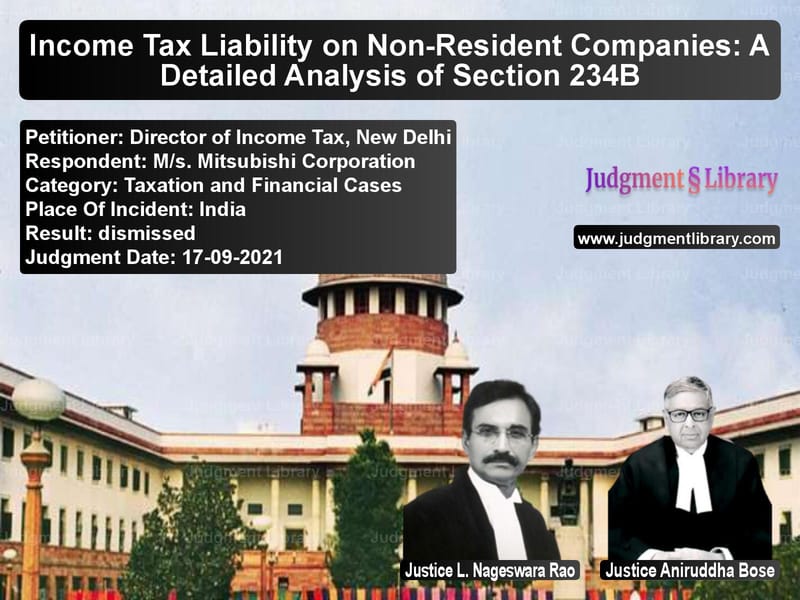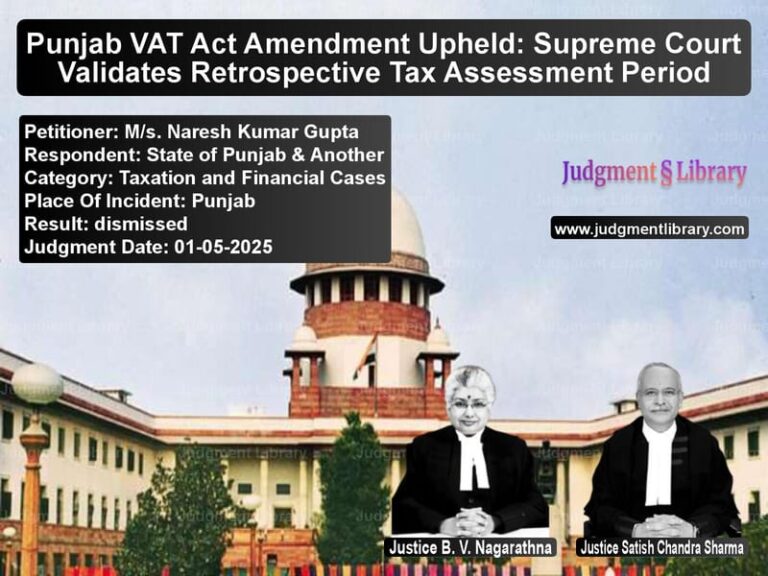Income Tax Liability on Non-Resident Companies: A Detailed Analysis of Section 234B
The Supreme Court of India recently addressed a significant question regarding the liability of a non-resident assessee to pay interest on short payment of advance tax due to the payer’s failure to deduct tax at the time of payment. The case involved M/s. Mitsubishi Corporation, a non-resident company incorporated in Japan, which had operations in India and was subjected to tax assessments by Indian authorities. The key issue revolved around the interpretation of Section 234B of the Income Tax Act, 1961.
The assessing officer determined that a portion of the income earned by the respondent was attributable to Indian operations and, thus, liable to be taxed in India. The respondent, however, challenged this tax liability, particularly the imposition of interest under Section 234B. The primary question before the Court was whether the respondent-assessee was liable to pay interest when tax was deductible at source from payments made to it.
Background of the Case
The case began with a notice issued under Section 143(2) of the Income Tax Act. Subsequently, an assessment order was passed for the assessment years 1998-99 to 2004-05, holding that the respondent was liable to pay tax in India. The assessing officer imposed interest under Section 234B, which the respondent contested before the Commissioner of Income Tax (CIT).
The CIT upheld the assessing officer’s decision, dismissing the respondent’s appeal. However, the Income Tax Appellate Tribunal (ITAT) ruled in favor of the respondent, holding that when tax at source was deductible, the respondent could not be held liable for payment of interest under Section 234B. This decision was upheld by the Delhi High Court, prompting the Director of Income Tax, New Delhi, to appeal before the Supreme Court.
Arguments Presented
Petitioner’s Arguments
- The obligation of the assessee to pay advance tax is independent of the payer’s obligation to deduct tax at source.
- Section 234B is compensatory in nature and is meant to compensate the government for the loss of revenue due to unpaid tax.
- The revenue has the right to recover unpaid tax from either the payer or the assessee.
- Under Sections 190 and 191 of the Income Tax Act, the assessee remains liable for advance tax even if the payer fails to deduct tax at source.
- The phrase “would be deductible or collectible at source” under Section 209(1)(d) should not be interpreted to exempt an assessee from liability when tax is not deducted.
Respondent’s Arguments
- Section 234B should not be read in isolation but should be interpreted in conjunction with Section 209 of the Act.
- An assessee cannot be penalized for a default committed by the payer, as established by previous court judgments.
- The Income Tax Act provides for penal action against the payer who fails to deduct tax at source, and imposing additional liability on the assessee is unjust.
- Prior to the Finance Act, 2012, the law allowed assessees to reduce their advance tax liability by the amount of tax deductible at source.
- Since the respondent had no advance tax liability under Section 209(1)(d), the levy of interest under Section 234B was not justified.
Supreme Court’s Judgment
The Supreme Court analyzed Sections 209 and 234B of the Income Tax Act in detail. The Court concluded that prior to the Finance Act, 2012, an assessee could reduce its advance tax liability by the amount of tax deductible at source, regardless of whether the tax was actually deducted. As a result, the respondent was not liable to pay interest under Section 234B for the relevant assessment years.
The Court emphasized that the 2012 amendment to Section 209(1)(d) clarified that in future cases, an assessee would be liable for advance tax even if the payer failed to deduct tax at source. However, since this amendment was prospective, it did not apply to the respondent’s case.
Analysis of Section 234B and Its Implications
Section 234B imposes interest on an assessee for default in payment of advance tax. According to this provision, if an assessee fails to pay advance tax or pays less than ninety percent of the assessed tax, they are liable to pay simple interest at the rate of one percent per month.
The key issue in this case was whether an assessee should be held responsible for shortfall in advance tax due to non-deduction of tax at source by the payer. The Court noted that under Section 209(1)(d), an assessee was permitted to reduce the amount of tax deductible at source while computing advance tax liability. This interpretation had been followed by various High Courts, including the Bombay High Court and Uttarakhand High Court.
Impact of the 2012 Amendment
The Finance Act, 2012, introduced a proviso to Section 209(1)(d), explicitly stating that an assessee could not reduce advance tax liability by the amount of tax deductible at source if the payer failed to deduct it. The memorandum explaining the amendment clarified that the change was made to address conflicting court rulings.
The Supreme Court observed that since the amendment was prospective, it did not affect cases prior to the financial year 2012-13. As a result, the respondent was entitled to claim reduction in advance tax liability for the relevant years.
Conclusion
The Supreme Court dismissed the appeals filed by the Revenue, affirming the judgment of the Delhi High Court. The ruling clarified that before the 2012 amendment, non-resident assessees could not be held liable for interest under Section 234B due to payer defaults in tax deduction.
This judgment sets an important precedent in tax law, particularly for non-resident companies operating in India. It reinforces the principle that liability for tax deduction primarily rests with the payer and that an assessee should not be penalized for defaults beyond their control.
Petitioner Name: Director of Income Tax, New Delhi.Respondent Name: M/s. Mitsubishi Corporation.Judgment By: Justice L. Nageswara Rao, Justice Aniruddha Bose.Place Of Incident: India.Judgment Date: 17-09-2021.
Don’t miss out on the full details! Download the complete judgment in PDF format below and gain valuable insights instantly!
Download Judgment: director-of-income-t-vs-ms.-mitsubishi-corp-supreme-court-of-india-judgment-dated-17-09-2021.pdf
Directly Download Judgment: Directly download this Judgment
See all petitions in Income Tax Disputes
See all petitions in Tax Refund Disputes
See all petitions in Tax Evasion Cases
See all petitions in Banking Regulations
See all petitions in Judgment by L. Nageswara Rao
See all petitions in Judgment by Aniruddha Bose
See all petitions in dismissed
See all petitions in supreme court of India judgments September 2021
See all petitions in 2021 judgments
See all posts in Taxation and Financial Cases Category
See all allowed petitions in Taxation and Financial Cases Category
See all Dismissed petitions in Taxation and Financial Cases Category
See all partially allowed petitions in Taxation and Financial Cases Category







